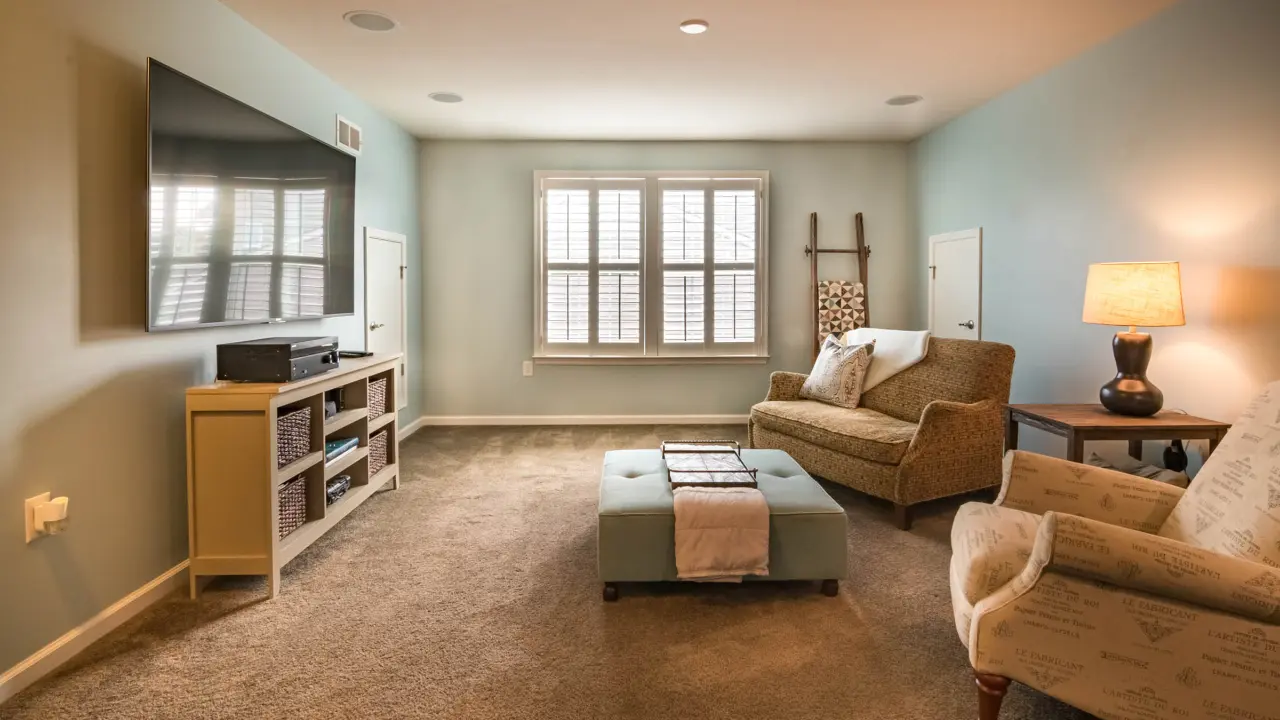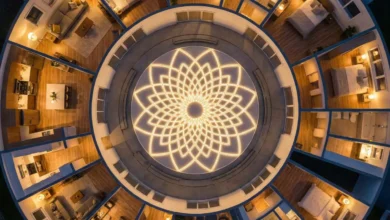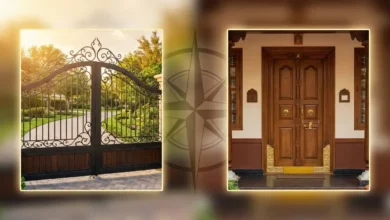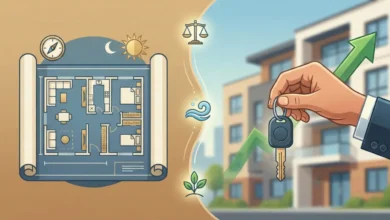West Facing House Vastu: Guide, Tips & Remedies

A west facing house vastu is all about designing and arranging your home according to the direction it faces—the west. In Vastu Shastra, the ancient Indian science of architecture, the orientation of your house is considered extremely important. It influences energy flow, health, wealth, relationships, and overall happiness.
While some people mistakenly believe that west-facing homes are less auspicious than east-facing ones, a properly designed west-facing house can be just as beneficial, if not more.
This guide explores everything from benefits and challenges to room-wise tips, remedies, and common misconceptions about west-facing houses, ensuring your home is harmonious, prosperous, and full of positive energy.
What Do You Mean by West Facing House Vastu?
A west-facing house is defined as a home where the main entrance faces the west direction. In Vastu Shastra, the orientation of your house is vital because each direction has its own energy characteristics. West-facing homes are associated with opportunities, business growth, and evening sunlight, which positively affects the home’s energy.
When you design your house in alignment with west facing house vastu, energy from the natural environment is optimally utilized, creating a positive atmosphere in all areas of life. Proper alignment is not just about doors and walls; it extends to room positioning, furniture placement, ventilation, colors, and even landscaping.
Importance of Main Entrance Direction
The main entrance is the most important element in any Vastu-compliant house. For a west-facing home, the main entrance determines how energy enters the house. Ideally, the entrance should be placed towards the north-west or center of the west wall. A wrong placement, such as in the south-west corner, can block positive energy and invite obstacles in finances, health, or relationships.
Decorating the entrance with auspicious symbols, clean pathways, and good lighting is also important. This not only improves energy flow but also creates a welcoming and positive environment for family and guests.
Difference Between Facing and Entrance
It is common to confuse the facing direction of the house with the direction of the main entrance. The facing direction is determined by the outward direction your house faces, while the entrance direction depends on where the main door is located.
For example, a house may face west, but if the entrance is slightly angled toward the north-west, it will influence energy differently. A precise understanding of these directions is crucial for applying west facing house vastu rules correctly.
Also Read
Advantages of West Facing Houses
One of the main advantages of a west-facing home is its association with wealth and career growth. According to west facing house vastu, homes facing west benefit business-minded individuals, entrepreneurs, and professionals. Proper alignment and room placement can enhance financial stability, attract new opportunities, and support career advancement.
For families engaged in business or commercial activities, a west-facing home is considered highly auspicious when Vastu principles are applied correctly. It is believed to create an environment conducive to decision-making, innovation, and prosperity.
Social and Popularity Advantages
A west-facing home can also improve social reputation and visibility. According to Vastu Shastra, this direction helps homeowners gain recognition, leadership qualities, and better interpersonal relationships. Whether hosting gatherings, social events, or community meetings, west-facing homes can enhance social energy and strengthen family bonds.
In addition, the main entrance and its decoration play a significant role in attracting positive social energy. Cleanliness, decorative symbols, and proper lighting create a welcoming atmosphere, which invites positivity and recognition from neighbors and visitors.
Evening Sunlight and Natural Energy
West-facing homes receive sunlight mainly in the evening. This exposure to the evening sun is beneficial in colder climates as it naturally warms the house, reduces dampness, and enhances energy circulation. Sunlight also helps in maintaining healthy indoor environments by preventing mold and bacteria growth.
In terms of Vastu, evening sunlight in west-facing homes is believed to bring energy that supports relaxation, mental clarity, and peaceful family life. With proper window placements and ventilation, the natural light can illuminate living spaces while keeping energy balanced.
Common Challenges in West Facing Houses
One of the challenges of west-facing homes is exposure to afternoon sun. The direct sunlight during peak hours can make interiors hot and uncomfortable, especially in summer months. Improper planning may lead to overheating of rooms, higher cooling costs, and discomfort for residents.
Solutions include shading, using thick curtains, planting trees on the west side, and choosing wall colors that reflect sunlight. These measures can mitigate heat while maintaining positive energy flow, as per west facing house vastu principles.
Entrance Placement Issues
The entrance is the gateway for energy into the home. If the main door is incorrectly positioned, it can block positive energy, creating obstacles in career, finances, or family life. For example, placing the door in the south-west corner is considered inauspicious.
Correct placement of the entrance, combined with decorations, lighting, and cleanliness, is essential for maintaining energy balance in a west-facing house. Even minor misalignments can be corrected using Vastu remedies, which we will discuss later.
Layout and Structural Limitations
Sometimes the plot shape or surrounding environment may restrict ideal placement of rooms or entrances. Irregular plot shapes, extensions in the south-west, or uneven slopes can create Vastu defects in west-facing houses.
By consulting a Vastu expert, these limitations can be addressed using remedies such as mirrors, colors, symbols, or furniture arrangements. Proper attention to these structural elements ensures the house remains positive and balanced.
Also Read
West Facing House Vastu Room-wise Tips

For a west-facing house, the main entrance should ideally be in the north-west or center of the west wall. Avoid placing it in the south-west corner. A well-maintained, clean, and decorated entrance attracts positive energy and prosperity.
Decorations can include Vastu symbols like Swastik, Om, or Ganesh idols, fresh flowers, and proper lighting. Avoid clutter and obstacles in front of the door to allow smooth energy flow.
Living Room Placement
The living room should ideally be in the north-east, north, or east zone of the house. This placement ensures maximum natural light and ventilation, which contributes to a lively and energetic atmosphere.
Furniture should be placed in a way that maintains free movement and allows energy to circulate. Avoid heavy items in the north-east corner, as this may block positive energy.
Kitchen Placement
The kitchen should be located in the south-east corner of a west-facing home. If south-east is not available, the north-west corner is an alternative. Avoid placing the kitchen in the south-west, as it may disturb health and family harmony.
Cooking in the south-east corner is believed to enhance health, wealth, and positive energy. Ensure proper ventilation and natural light in the kitchen to maintain energy balance.
Also Read
Master Bedroom and Children’s Rooms
The master bedroom should be in the south-west zone, as it provides stability and control for the head of the family. Children’s bedrooms can be placed in the west, south, or north-west directions, ensuring proper growth, focus, and positive energy.
Heavy furniture should be placed in the south-west, while lighter furniture is best suited for north-east or east zones. This arrangement balances energy throughout the home.
Also Read
Pooja Room and Study Room
The pooja room should be located in the north-east or east direction. If the pooja room is in the west zone, idols should face east to maintain positivity. The study room is ideally placed in the north-east or east to enhance concentration, focus, and learning abilities.
Decorate these rooms with proper lighting, minimal clutter, and soft colors to maintain spiritual and mental energy flow.
Bathrooms, Toilets, and Utility Areas
Bathrooms and toilets should be in the north-west or west corners. Avoid placing them in the south-west zone, as it may disturb energy balance and invite health issues. Utility areas like laundry rooms should also be in the north-west zone for optimal functionality and energy flow.
West Facing House Vastu Remedies
If the main entrance is placed incorrectly, energy flow can be corrected using Vastu symbols, crystals, or copper plates. Installing a Swastik or Om symbol above the main door is a common remedy.
Other remedies include lighting the entrance area, keeping it clean, and using decorative elements that enhance positive energy.
Placing heavier furniture in the south-west zone and lighter items in the north-east helps balance energy. Avoid clutter in hallways and entrances to maintain smooth energy circulation. Mirrors can also be used strategically to reflect positive energy and correct minor structural defects.
Lighter colors like cream, off-white, or light blue are ideal for west-facing homes. These colors reflect sunlight, reduce heat, and enhance positive energy. Avoid dark shades that may block light and create stagnant energy.
Accent walls can be used strategically in south and west zones to balance energy while maintaining aesthetics.
Planting trees, shrubs, or creepers on the west side of the house can help reduce heat and create a cooling effect. Keep the north-east and east areas open and clutter-free for free energy flow. Small water elements or fountains in the north-east can also enhance positive energy.
Common Myths About West Facing House Vastu
Many believe west-facing houses are inherently inauspicious. However, when west facing house vastu principles are applied, these homes can be highly beneficial. Properly designed west-facing homes can bring wealth, stability, and harmony.
How Vastu Remedies Can Fix “Defects”
Even if structural limitations exist, remedies such as door adjustments, furniture placement, colors, and symbols can restore balance. Many Vastu defects in west-facing homes can be effectively corrected to ensure positivity and prosperity.
Wrap Up
A west facing house vastu is highly effective in creating a positive, prosperous, and harmonious living environment. By following proper guidelines for entrance placement, room layouts, colors, furniture, and remedies, you can maximize benefits while overcoming challenges such as heat or structural limitations.
Even if your west-facing home has some defects, Vastu remedies can correct them, making your house a source of wealth, peace, and happiness for your family.





